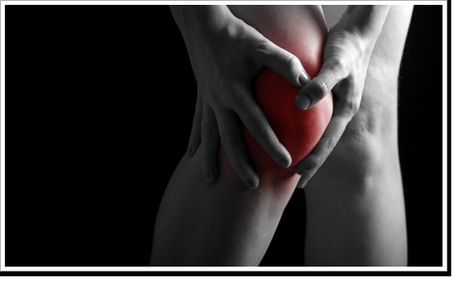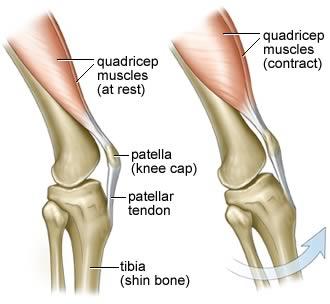 Knee pain is a common problem for both athletes and non-athletes. For someone who has not been involved in a traumatic injury, a condition called patellofemoral pain syndrome (PFPS) may be the problem. PFPS goes by several other names, including chondromalacia patella, patellar pain syndrome, and anterior knee pain.
Knee pain is a common problem for both athletes and non-athletes. For someone who has not been involved in a traumatic injury, a condition called patellofemoral pain syndrome (PFPS) may be the problem. PFPS goes by several other names, including chondromalacia patella, patellar pain syndrome, and anterior knee pain.
What is Patellofemoral Pain Syndrome?
Patellofemoral pain syndrome refers to pain at the front of the knee, in and around the kneecap. (The kneecap, or patella, is the triangle-shaped bone at the front of the knee joint. The pain usually is accompanied by tenderness along the edges of the patella.
The Patellofemoral Joint
The knee comprises of the union of 3 bones – the long bone of the thigh (femur), the shin bone (tibia) and the knee cap (patella) (figure 1). The patella (knee cap) is situated at the front of the knee and lies within the tendon of the quadriceps muscle (the muscle at the front of the thigh). The quadriceps tendon envelops the patella and attaches to the top end of the tibia (figure 1). Due to this relationship, the knee cap sits in front of the femur forming a joint in which the bones are almost in contact with each other. The surface of each bone, however, is lined with cartilage to allow cushioning between the bones. This joint is called the patellofemoral joint.

Usually there is pain and/or stiffness under or around the patella. This may occur to both knees simultaneously, and often occurs gradually over time. Pain can be worsened by activities, especially climbing, squatting or running, but can also be worse after prolonged periods of sitting with knees bent. A feeling of giving way can occur which is caused by the inhibition of muscle contraction in response to pain.
A popping sensation may occur in some cases, but the knee usually does not swell or lock with patellofemoral pain syndrome. These symptoms can be an indication of a different knee injury.
How does it occur?
Patellofemoral pain syndrome can occur from overuse of the knee in sports and activities such as running, walking, jumping, or bicycling.
The kneecap (patella) is attached to the large group of muscles in the thigh called the quadriceps. It is also attached to the shin bone by the patellar tendon. The kneecap fits into grooves in the end of the thigh bone (femur) called the femoral condyle. With repeated bending and straightening of the knee, you can irritate the inside surface of the kneecap and cause pain.
Patellofemoral pain syndrome also may result from the way your hips, legs, knees, or feet are aligned. This alignment problem can be caused by your having wide hips or underdeveloped thigh muscles, being knock-kneed, having subluxations or having feet with arches that collapse when walking or running (a condition called over-pronation).
Fortunately, studies show that 80% of PFPS sufferers respond well to non-invasive treatment.
Treatment for Patellofemoral Pain Syndrome in Augusta GA
The focus of your treatment for patellofemoral pain syndrome will be to identify the underlying cause, and correct this, which will allow the patella to slide smoothly over the femur and so not irritate or cause increased wear on the cartilage. Poor alignment of the patella combined with overuse can cause inflammation and degeneration of the joint cartilage underneath the kneecap (patella). If this cartilage becomes damaged you will feel pain.
As Augusta GA Chiropractors experienced in treating PFPS, we can formulate treatments tailored for your specific condition. Additionally, we are only chiropractors in Augusta GA that can provide chiropractic treatments in combination with FDA-approved cold laser therapy to help reduce the inflammation that is often found in PFPS sufferers. If you are an athlete, we also can identify the risk factors of developing PFPS, and can treat you to reduce the likelihood of you developing this condition and having to take time out of training and competing while you recover.
The Georgia Clinic of Chiropractic Blog is written by Dr. Mark Huntsman.
For a chiropractor in Augusta GA, Georgia Clinic of Chiropractic provides customized treatments to Augusta GA, Martinez GA, and Evans GA patients. Visit the main website at www.georgia-clinic.com for customized treatments.
Choose several options to schedule your appointment: call (706) 814-5053 or use our online form.
